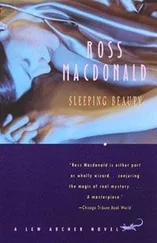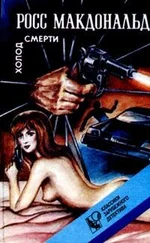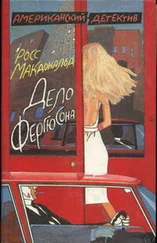The .45 in his hand dragged him toward me. His slouching silence was worse than any words. If I was going to get it, this was the time and place, under a white valley sky, in the middle of a case I’d never solve. Sweat ran in cold runnels under my clothes, and the drip of blood from my chin counted off the seconds.
The woman stepped around me. “Brand. This man has been kind to me. He doesn’t mean any harm. Don’t hurt him. Please.”
Her hands reached for the gun and pushed it down. She walked close into him and stood with her face against his shoulder. “Say that you won’t hurt him. Please. There mustn’t be any more killing.”
He looked down at the top of her head as if he had never seen her before. Slowly his eyes focused.
“There won’t be any more.” His voice was deep in his throat. “I came to take you home, Hildie. Will you come home with me?”
She nodded, leaning against him like a dutiful doll.
“Go and get into the car, then. I’ll be along in a minute.”
“No more trouble? You promise?”
“No more trouble. I promise.”
He thrust the blue gun back into its holster. Their bodies came apart gradually like a giant cell dividing. She walked with stunned leisureliness along the path to the street. He watched her all the way until she was in the front seat with the door closed. Then he picked up his hat and turned to me, brushing it on his sleeve: “I’m willing to forget about this, if you are.”
“I’m not, though.”
“You’re making a mistake.”
“You make your mistakes and I’ll make mine.”
“Damn it, Archer, can’t we get together?”
“Not on any terms that would suit you. I’m staying in Las Cruces until this thing is finished. Try slapping charges on me and I’ll show you a couple of charges of my own.”
“Such as?”
“Failure to do your duty. Conspiring with hoods.”
“No.” He reached for my arm. “You don’t understand.”
I stepped back out of his reach. “I understand this. I’m trying to solve two homicides, and something is trying to stop me. Something that looks like law and talks like law but doesn’t smell like law. Not in my nostrils. It smells like zombie meat. A zombie that takes the public’s money and sits behind a courthouse desk pretending to be an officer.”
“I’ve always done my duty.” But he said it without conviction. His anger had turned inward, and his corroded snarl was chewing on itself.
“Did you do it last night, when that truck broke out of the county?”
He didn’t answer. He stood and looked at the ground between us, then turned on his heel and walked toward his car, stumbling a little. The back of his coat was split. There was a streak of dirt on the crown of his Stetson. In the diffused light, his body cast a faint and wavering shadow.
I found a doctor and had eight stitches put in my face. The doctor seemed to take it as a matter of course and asked no questions. When the job was finished, though, he asked me for twenty-five dollars in cash. He was that kind of a doctor, or I was that kind of a patient.
When I left his office, I had a powerful impulse to climb into my car and drive away from Las Cruces and never come back. I couldn’t think of a single solid reason for staying. So I drove across town to the courthouse, accompanied by my Messianic complex.
Its towered white concrete ell was surrounded by lawns as green as the artificial grass that undertakers use to hide the meaning of their work. Over the front entrance a bas-relief of blind justice faced the sun. Far above her dim and bandaged head, the iron hands of the tower clock pointed at three thirty.
A tiled staircase led up to the District Attorney’s second-floor suite. In the anteroom a heavy blonde with commissar eyes surveyed me from behind the barricades of her bosom. After taking my name and consulting her intercom, she escorted me past several doors to the D. A.’s private office. It was a large sunlit room with a minimum of furniture. A few small human touches softened its bright impersonality: the photograph of a young and pretty woman on the desk, shelves of books that weren’t all law books, a pair of Don Freeman lithographs on the walls.
I’ve dealt with three main classes of district attorney. One is the slightly punchy, amiable type who has failed or almost failed in private practice and ended up in the courthouse, polishing apples for the people who put him there. One is the rising young lawyer who is using the office as a springboard to higher office or a richer practice. The third type, not so rare as it used to be, is the public servant who would rather live in a clean community than please a friend or get his picture in the paper.
Westmore seemed to belong in the second category. He offered me a cigarette and lit it for me, using the opportunity to study my face. His own was thin and jut-boned, ambitious-looking to the point of asceticism. It was marked with rimless spectacles and surmounted by a brush of prematurely gray hair like upright iron filings.
After placing a chair for me, he sat down behind his desk. “You’re an elusive character, Mr. Archer.”
“Sorry. I have had ground to cover.”
“You appear to have covered it on all fours.” His voice was sharp and intelligent, threaded with irony. “As a matter of fact, I was thinking seriously of having a warrant issued.”
“On what charge?”
“There are several possibilities. Resisting an officer, for instance. We take a fairly dim view of that sort of thing in Las Cruces.” His mouth was prim.
“You mean Church?”
“I mean Deputy Braga.”
“Braga got what was coming to him. I could have taken the girl if he hadn’t tackled me.”
“Braga realizes that now. However, I’d stay out of dark alleys if I were you. And I wouldn’t advise you to try it again, on Braga or anyone else in the sheriff’s department. The one thing that’s keeping you out of jail is the fact that you did report that car at the airport.”
“Church gave me credit for that?”
“Naturally. The sheriff gives credit where credit is due. And the Buick was what we needed to give us a lead on Bozey.”
“So Meyer told me. Take it Bozey hasn’t been caught.”
“Not yet. But I’ve had a teletype since I talked to Meyer. Bozey’s rap sheet stretches from here to there.” Westmore picked up a yellow flimsy from his out-basket and scanned it. “Petty theft and vandalism when he was still in grade school, repeated car theft in the next few years: carrying concealed weapons, mugging, holdup. The usual progression. Counting a year at Preston, he’s spent seven of the last eleven years behind walls.”
“Where does he come from?”
“The west side of Los Angeles, originally. But he’s been arrested in five Western states. His last conviction was for driving a truck for a gang of bootleggers in New Mexico. He got out in July and switched his operations to the Northwest.”
“Did he knock off the bank in Portland by himself?”
“So far as they know, it was a one-man job. At least he was the only one who entered the bank.”
“And he walked out with twenty thousand dollars?”
“Twenty-two thousand plus. Unfortunately for him, he couldn’t spend it. They had a fairly complete fist of the stolen bills, and they circularized the coast and the whole Southwest. That car-purchase in Los Angeles seems to have been his only major attempt to pass any of it. He got the car all right, but the deal backfired. He had to clear out of Los Angeles with the police one jump behind him. They checked out of a Main Street hotel less than an hour before the police got there.”
“The girl was with him then?”
Читать дальше







